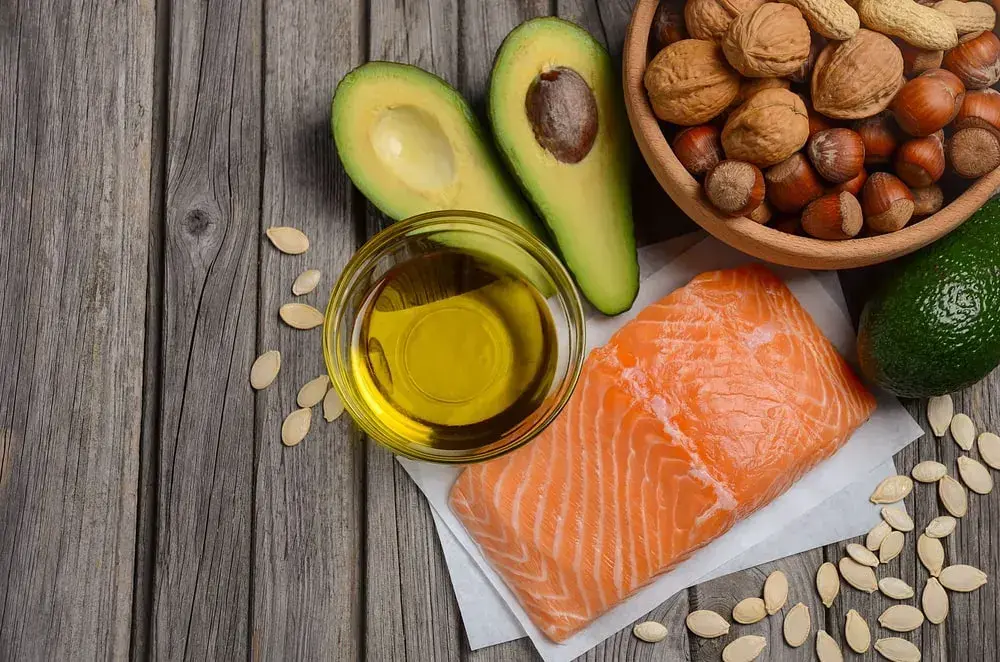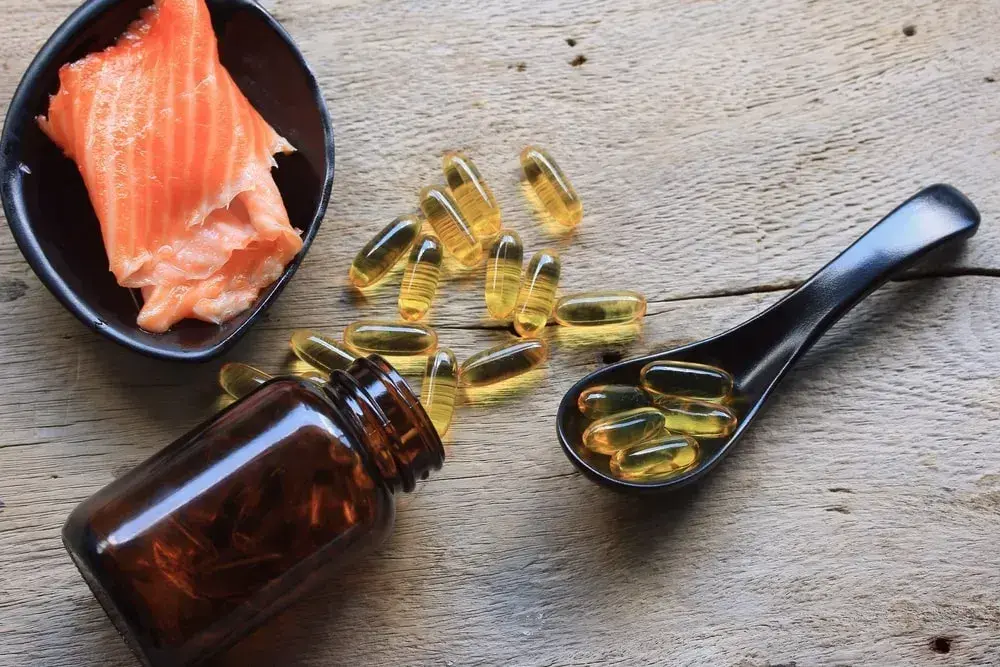4 min read
10 Healthy Fats You Should Be Eating More Of
Garcia Weight Loss
:
Oct 4, 2018 12:00:00 AM

/assets/images/provider/photos/2579656.jpg)
Many people cringe when they see a big number in the “total fat” column on a nutrition label. But, don’t shy away from high-fat foods based on that number alone. Fats are necessary for many processes throughout the body — just make sure you’re choosing healthy fats like unsaturated fats, and avoiding dangerous fats, particularly trans fat.
Many high-fat foods are not only good for you, but they’re essential if you’re trying to lose weight without hunger and improve your health in general. The following are a few foods that contain high amounts of healthy fat and are chock full of other nutrients as well.
1. Fatty fish
As mentioned in our previous blog post, fish are one of the best ways to get a big dose of omega-3 fatty acids, specifically DHA and EPA. These fats offer a number of health benefits, including better brain health, a lower risk of heart disease, and anti-inflammatory power.
Not all fish have a high dose of these fats, however. Look for salmon, sardines, and mackerel for the biggest omega-3 punch. Fatty fish is also a good source of protein. Both fat and protein can help you feel fuller, longer, and should be included in every meal. People who eat higher amounts of fish may have a lower risk of heart attack and stroke than people who don’t eat it. Eat broiled and grilled fish two to three times a week, and avoid deep-fried or breaded varieties.
If you aren’t getting enough fish in your diet, consider taking a high-quality fish oil supplement.
2. Olives and extra virgin olive oil
Olives and their oil are high in monounsaturated fats, which lower bad cholesterol and, therefore, the risk of heart attack and stroke. They also contain powerful antioxidants, including vitamin E, that help fight cancer and other diseases.
While many people enjoy olives on a salad or pasta, or even by themselves as a snack, those who don’t favor the taste may still enjoy olive oil for cooking and dressings. Look for extra-virgin olive oil that’s not refined or processed with chemicals to get the oil highest in natural nutrients.
3. Flaxseeds
The tiny flax seed has big nutritional benefits, but you must know which kind of flaxseed to eat in order to get these advantages. Flaxseeds are high in alpha-linolenic acid (ALA), an omega-3 fat that keep arteries healthy. They also contain lignans, which have antioxidant power, and a good dose of fiber.
Flaxseeds have a nutty flavor that blends well into smoothies. But, don’t use the whole seeds for eating. Their small size makes them difficult to chew and break down effectively in the body. Instead, purchase flaxseed meal or ground flaxseed and add it to your recipes. Flaxseed oil is also nutritious, but the ground seeds will give you more of a fiber and nutrient boost than the oil alone.
4. Eggs with yolks
Eggs have had an up-and-down health status for years, mostly because they contain cholesterol. But, experts no longer believe that eating cholesterol will necessarily raise blood cholesterol. Look for eggs that are high in omega-3 fats, which come from chickens that are fed and/or raised in environments that result in eggs higher in these healthy fats. Eat the yolk: while the whites are high in protein and low in calories, the yolk contains many of the egg’s vitamins and nutrients, including the healthy fats. Eggs may also raise HDL (good) cholesterol, protecting you from heart disease.
5. Almonds and almond butter
Pound for pound, almonds are higher in calories than low-calorie foods like fruits and vegetables. But their healthy fats and other nutrients are well worth the calories, especially if you stick to a small serving of these popular tree nuts. Like olives, almonds also contain high amounts of heart-healthy monounsaturated fat. Almonds also contain vitamin E and B vitamins. They contain high-quality plant protein and fiber to help stave off hunger. One study found that women who ate almonds lost more weight and had a lower risk of heart problems than the women who didn’t eat them.
6. Whole-milk yogurt from grass-fed cows
Yogurt contains a number of nutrients, such as calcium, vitamin D, potassium, and phosphorus, plus friendly bacteria known as probiotics that help with digestion and may even help ward off some diseases. Don’t consume fat-free dairy, as the healthy fats have been removed and are often replaced with added sugar. Whole-fat dairy contains fats such as conjugated linoleic acid, which may help the body break down excess fat. Consume organic milk that comes from grass-fed cows, as it contains healthy fats and won’t contain artificial hormones or pesticides.
7. Grass-fed beef
The way cattle are fed directly affects the nutrients in the beef you eat. Grass-fed beef will contain less total fat and more heart-healthy fats than standard grain-fed varieties. In fact, studies show that grass-fed beef contains more antioxidants, omega-3 fats, and other fats that help ward off heart disease. Limit your beef consumption to twice a week, however, and get your protein from plant sources, lean poultry, and fish most of the time.
8. Avocado
Well over half of the calories in avocado are from fat, and it’s mostly monounsaturated fat. This fat has anti-inflammatory action, heart health benefits, and may even help fight cancer. The fat and high fiber content of this unique fruit will also help you feel fuller when you’re trying to lose weight. And, it contains nutrients that may keep eyes healthy.
9. Dark chocolate
While it has a number of health benefits, dark chocolate must be consumed in moderation due to its high calorie content and added sugar. But, a small square of dark chocolate daily packs in some important minerals and healthy fats. Cacao seeds are considered a superfruit, loaded with antioxidants. It also contains a good amount of monounsaturated fat. Make sure the dark chocolate you eat contains a very high amount of cocoa (more than 75 percent is best).
10. Chia seeds
These seeds have become a popular additive in health food circles for good reason. They are low in carbs and high in fiber, and over half of their fat content is heart-healthy, anti-inflammatory omega-3. They can be added to smoothies, yogurt, or baked goods without much change to the flavor of dishes. They also contain a high amount of calcium and protein.
Rather than avoiding or limiting high-fat foods, learn which ones are healthy and embrace them. In particular, monounsaturated fats and omega-3s are great ways to boost your health.
If you’re wondering how much fat you need or how to get it in healthy ways, Garcia Weight Loss and Wellness Centers can help. We will customize a diet plan and wellness program that works for you and your health goals. Contact us today to request your no-cost consultation.



